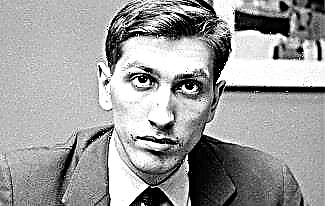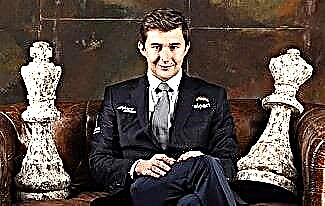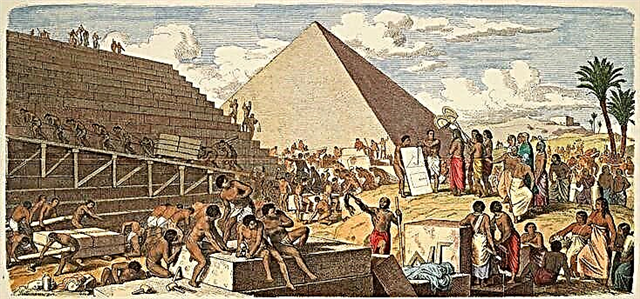Jean-Paul Charles Aimard Sartre (1905-1980) - French philosopher, representative of atheistic existentialism, writer, playwright, essayist and teacher. Winner of the 1964 Nobel Prize in Literature, which he refused.
There are many interesting facts in the biography of Jean-Paul Sartre, which we will talk about in this article.
So, before you is a short biography of Sartre.

Biography of Jean-Paul Sartre
Jean-Paul Sartre was born on June 21, 1905 in Paris. He grew up in the family of a soldier Jean-Baptiste Sartre and his wife Anne-Marie Schweitzer. He was the only child of his parents.
Childhood and youth
The first tragedy in the biography of Jean-Paul occurred at the age of one, when his father passed away. After that, the family moved to the parental home in Meudon.
The mother loved her son very much, trying to provide him with everything he needed. It is worth noting that Jean-Paul was born with a squinting left eye and a thorn in his right eye.

Excessive care of the mother and relatives developed in the boy such qualities as narcissism and arrogance.
Despite the fact that all relatives showed sincere love for Sartre, he did not reciprocate them. An interesting fact is that in his work "Lay", the philosopher called life in the house a hell filled with hypocrisy.
In many ways, Jean-Paul became an atheist due to the tense atmosphere in the family. His grandmother was Catholic, while his grandfather was Protestant. The young man was a frequent witness of how they ridiculed each other's religious views.
This led to the fact that Sartre felt that both religions were of no value.
As a teenager, he studied at the Lyceum, after which he continued to receive his education at the Higher Normal School. It was during that period of his biography that he developed an interest in the struggle against power.
Philosophy and Literature
Having successfully defended his philosophical dissertation and worked as a teacher of philosophy at the Le Havre Lyceum, Jean-Paul Sartre went on an internship in Berlin. Returning home, he continued to teach in various lyceums.
Sartre was distinguished by an excellent sense of humor, high intellectual abilities and erudition. It is curious that in one year he managed to read over 300 books! At the same time, he wrote poetry, songs and stories.
It was then that Jean-Paul began to publish his first serious works. His novel Nausea (1938) caused a great resonance in society. In it, the author talked about the absurdity of life, chaos, the absence of meaning in life, despair and other things.

The main character of this book comes to the conclusion that being gets meaning only through creativity. After that, Sartre presents another work - a collection of 5 short stories "The Wall", which also resonates with the reader.
When World War II (1939-1945) began, Jean-Paul was drafted into the army, but the commission declared him unfit for service due to his blindness. As a result, the guy was assigned to the meteorological corps.
When the Nazis occupied France in 1940, Sartre was captured, where he spent about 9 months. But even in such difficult circumstances, he tried to be optimistic about the future.
Jean-Paul loved to amuse his neighbors in the barracks with funny stories, participated in boxing matches and was even able to stage a performance. In 1941, the half-blind prisoner was released, as a result of which he was able to return to writing.
A couple of years later, Sartre published the anti-fascist play The Flies. He hated the Nazis and mercilessly criticized everyone for not making any effort to resist the Nazis.
By the time of his biography, the books of Jean-Paul Sartre were already very popular. He enjoyed authority both among representatives of high society and among the common people. The published works allowed him to leave teaching and concentrate on philosophy and literature.
At the same time, Sartre became the author of a philosophical study called "Being and Nothing", which became a reference book for French intellectuals. The writer developed the idea that there is no consciousness, but only awareness of the surrounding world. Moreover, each person is responsible for his actions only to himself.

Jean-Paul becomes one of the brightest representatives of atheistic existentialism, which rejects the fact that behind beings (phenomena) there can be a mysterious Being (God), which determines their "essence" or truth.
The philosophical views of the Frenchman find a response among many compatriots, as a result of which he has many followers. Sartre's expression - "a man is doomed to be free", becomes a popular motto.
According to Jean-Paul, the ideal human freedom is the freedom of the individual from society. It is worth noting that he was critical of Sigmund Freud's idea of the unconscious. In contrast, the thinker declared that man is constantly acting consciously.
Moreover, according to Sartre, even hysterical attacks are not spontaneous, but deliberately rolled. In the 60s, he was at the peak of popularity, allowing himself to criticize social institutions and legislation.
When in 1964 Jean-Paul Sartre wanted to present the Nobel Prize in Literature, he refused it. He explained his act by the fact that he did not want to be indebted to any social institution, questioning his own independence.
Sartre has always adhered to leftist views, gaining a reputation as an active fighter against the current government. He defended Jews, protested against the Algerian and Vietnam wars, blamed the US for invading Cuba, and the USSR for Czechoslovakia. His house was blown up twice, and militants rushed into the office.
In the course of another protest, which escalated into riots, the philosopher was arrested, which caused serious outrage in society. As soon as this was reported to Charles de Gaulle, he ordered to release Sartre, saying: "France does not imprison Voltaires."
Personal life
While still a student, Sartre met Simone de Beauvoir, with whom he immediately found a common language. Later, the girl admitted that she had found her double. As a result, young people began to live in a civil marriage.
And although the spouses had a lot in common, at the same time their relationship was accompanied by many strange things. For example, Jean-Paul openly cheated on Simone, who, in turn, also cheated on him with both men and women.

Moreover, the lovers lived in different houses and met when they wanted. One of Sartre's mistresses was the Russian woman Olga Kazakevich, to whom he dedicated the work "The Wall". Soon Beauvoir seduced Olga by writing the novel She Came to Stay in her honor.
As a result, Kozakevich became a “friend” of the family, while the philosopher began courting her sister Wanda. Later, Simone entered into an intimate relationship with her young student Natalie Sorokina, who later became Jean-Paul's mistress.
However, when Sartre's health deteriorated and he was already bedridden, Simone Beauvoir was always with him.
Death
At the end of his life, Jean-Paul became completely blind due to progressive glaucoma. Shortly before his death, he asked not to arrange a magnificent funeral and not write loud obituaries about him, since he did not like hypocrisy.
Jean-Paul Sartre died on April 15, 1980 at the age of 74. The cause of his death was pulmonary edema. About 50,000 people came to the last path of the philosopher.
Photo by Jean-Paul Sartre














